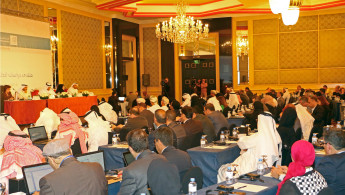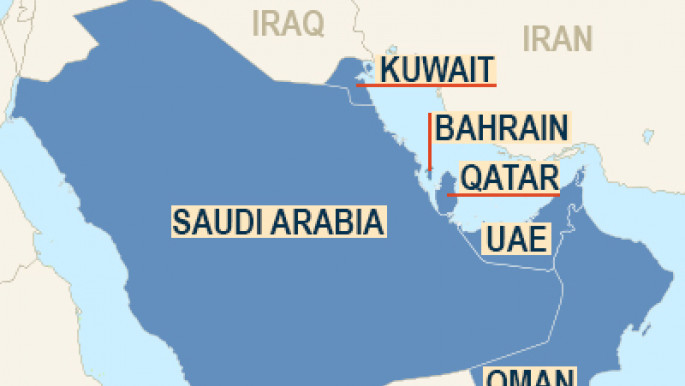Calls for 'dialogue' with Iran ahead of Gulf summit
Calls for 'dialogue' with Iran ahead of Gulf summit
Analysis: International relations, security of Gulf nations, and Iran's influence in the region were the focus of talks held before the annual GCC summit.
3 min read
The Gulf and Arabian Peninsula Studies Forum [al-Araby al-Jadeed]
Iran took centre stage at a three-day conference focusing on regional and international challenges facing the Gulf Cooperation Council (GCC) states, as calls were made for dialogue with Tehran.
The Gulf and Arabian Peninsula Studies Forum is an annual event, which began on Saturday, hosted by the Arab Centre for Research and Policy Studies.
Lebanese academic Ghassan al-Azzi called for strategic dialogue between the GCC states and Iran - under a set of conditions and mutual concessions.
Azzi said that in order to achieve real security in the region, its people should be "more responsible".
Iraqi academic Dhafer al-Ani said there were two kinds of challenges the Gulf's security sector faces - in reference to the Iraqi conflict.
Speaking during the last day of the forum on Monday, Ani said the first challenge stemmed from the sectarian nature of the Iraqi political system.
The second, he said, was Baghdad's inability to prevent threats from spreading to and from Gulf states.
Ani said that the biggest threat came from growing Iranian influence in Iraq, which has become a key pillar in Iran's strategic security and one factor of its power projection in the region.
Tehran, he argued, had used Iraq to either block joint Arab action or to directly threaten the security of Gulf states.
Another Iraqi academic, Abd al-Wahab al-Qassab, said that although Decisive Storm was an Arab military operation concerned with Yemen and directed against the Houthis, allied with Iran and reportedly tasked with implementing its regional expansion plans, the clear challenge was to prevent Iran from showing its capabilities - or how even to subdue them if the situation warranted it.
Qassab gave examples of how Iran failed to impose "hegemony" on the region.
He said that its navy was stopped by Gulf states from opening a supply route to provide the Houthis with weapons and how an Iranian plane - which the Saudis said was carrying equipment and arms to the Houthis - was prevented from landing in Sanaa.
Standing out
Egyptian academic Naglaa Marei said that the Arab Spring changed the features of the UAE's foreign policy, which led to it adopting stances that were not compatible with those of other GCC and Arab states.
The UAE, she said, also extended diplomatic bridges between it and Iran, Europe and particularly the US.
Qatari academic Mohammad al-Musfir said that Qatar had used "soft power" in its international relations.
He said that the concept of soft power was based on the state possessing "a moral force", such as using media, technology and economic power, to influence global issues.
He said that Qatar was able to occupy a special position in international relations because of political will and by acting as a mediator in international disputes.
The final day of the Gulf Forum also discussed the GCC's relations with major global powers.
Russian academic Maxim Sukov, said that Saudi-Russian relations were still far from being stable because of contradictions in the interests of the two countries when it comes to cases related to the region.
Saudi academic Majed al-Turky, meanwhile, said the Gulf relied heavily on Russia for two reasons:
First, because of the US rapprochement with Iran, and second, Russia's realisation that Iran could pose a danger to the regions south of Russia, which has prompted Moscow to work on sidelining Iran and weakening its influence in Syria and Iraq.
On the first day of the forum, delegates - academics, researchers and experts - focused on educational affairs and then shifted to regional challenges and Iran's influence in the region by the final day on Monday.
The formal Gulf Cooperation Council summit which follows the Arab Centre for Research and Policys event, gets underway on Thursday.
The Gulf and Arabian Peninsula Studies Forum is an annual event, which began on Saturday, hosted by the Arab Centre for Research and Policy Studies.
Lebanese academic Ghassan al-Azzi called for strategic dialogue between the GCC states and Iran - under a set of conditions and mutual concessions.
Azzi said that in order to achieve real security in the region, its people should be "more responsible".
| The biggest threat comes from the growing Iranian influence in Iraq - Iraqi academic Dhafer al-Ani |
Iraqi academic Dhafer al-Ani said there were two kinds of challenges the Gulf's security sector faces - in reference to the Iraqi conflict.
Speaking during the last day of the forum on Monday, Ani said the first challenge stemmed from the sectarian nature of the Iraqi political system.
The second, he said, was Baghdad's inability to prevent threats from spreading to and from Gulf states.
Ani said that the biggest threat came from growing Iranian influence in Iraq, which has become a key pillar in Iran's strategic security and one factor of its power projection in the region.
Tehran, he argued, had used Iraq to either block joint Arab action or to directly threaten the security of Gulf states.
Another Iraqi academic, Abd al-Wahab al-Qassab, said that although Decisive Storm was an Arab military operation concerned with Yemen and directed against the Houthis, allied with Iran and reportedly tasked with implementing its regional expansion plans, the clear challenge was to prevent Iran from showing its capabilities - or how even to subdue them if the situation warranted it.
|
||
He said that its navy was stopped by Gulf states from opening a supply route to provide the Houthis with weapons and how an Iranian plane - which the Saudis said was carrying equipment and arms to the Houthis - was prevented from landing in Sanaa.
Standing out
Egyptian academic Naglaa Marei said that the Arab Spring changed the features of the UAE's foreign policy, which led to it adopting stances that were not compatible with those of other GCC and Arab states.
The UAE, she said, also extended diplomatic bridges between it and Iran, Europe and particularly the US.
Qatari academic Mohammad al-Musfir said that Qatar had used "soft power" in its international relations.
He said that the concept of soft power was based on the state possessing "a moral force", such as using media, technology and economic power, to influence global issues.
He said that Qatar was able to occupy a special position in international relations because of political will and by acting as a mediator in international disputes.
| Read more: IS, Yemen and Syria top priorities for GCC summit |
The final day of the Gulf Forum also discussed the GCC's relations with major global powers.
Russian academic Maxim Sukov, said that Saudi-Russian relations were still far from being stable because of contradictions in the interests of the two countries when it comes to cases related to the region.
Saudi academic Majed al-Turky, meanwhile, said the Gulf relied heavily on Russia for two reasons:
First, because of the US rapprochement with Iran, and second, Russia's realisation that Iran could pose a danger to the regions south of Russia, which has prompted Moscow to work on sidelining Iran and weakening its influence in Syria and Iraq.
On the first day of the forum, delegates - academics, researchers and experts - focused on educational affairs and then shifted to regional challenges and Iran's influence in the region by the final day on Monday.
The formal Gulf Cooperation Council summit which follows the Arab Centre for Research and Policys event, gets underway on Thursday.




